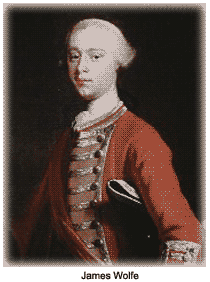 General James Wolfe, the hero of Québec, was a study in contrasts. He was often audacious in the execution of his craft, but the slight, red-haired young man was bookish and reserved in person. He was born in Westerham in Kent, England, the son of a prominent military figure. Wolfe was commissioned in the Royal Marines at age 14, not an unusual age for that era.
He saw action in the War of the Austrian Succession and the Jacobite Rebellion in Scotland, rising to lieutenant colonel by 1750. William Pitt noticed Wolfe after he penned a critique of the attack on Rochefort (1757). The secretary of state hoped to capitalize on Wolfe's aggressive spirit and named him second in command to Jeffrey Amherst; the duo quickly repaired British fortunes in the French and Indian War in North America.
Wolfe helped to execute siege warfare to perfection at Louisbourg in 1758, and was promoted to major general. He returned briefly to England to be treated for tuberculosis, but Pitt prevailed upon him to return to the front to lead the assault on Québec, a plan that Wolfe had promoted for some time.
Wolfe’s triumph on the Plains of Abraham is legendary. He was wounded three times in the short encounter, the third shot striking his lungs; he died shortly after receiving word of the British victory. His last words, upon learning of the victory, were "Then I die happy." The fall of the French capital in North America ended their empire, leaving Britain and Spain to vie for control of the continent.
Historians still debate the scope of Wolfe’s talents. He has been given high marks by some for his daring, his ability to make judgments quickly under stress and his superb coordination of land and naval forces. Others have argued that his reputation was inflated by his dramatic battlefield death and the overwhelming outpouring of public grief that took place in London when the news arrived.
General James Wolfe, the hero of Québec, was a study in contrasts. He was often audacious in the execution of his craft, but the slight, red-haired young man was bookish and reserved in person. He was born in Westerham in Kent, England, the son of a prominent military figure. Wolfe was commissioned in the Royal Marines at age 14, not an unusual age for that era.
He saw action in the War of the Austrian Succession and the Jacobite Rebellion in Scotland, rising to lieutenant colonel by 1750. William Pitt noticed Wolfe after he penned a critique of the attack on Rochefort (1757). The secretary of state hoped to capitalize on Wolfe's aggressive spirit and named him second in command to Jeffrey Amherst; the duo quickly repaired British fortunes in the French and Indian War in North America.
Wolfe helped to execute siege warfare to perfection at Louisbourg in 1758, and was promoted to major general. He returned briefly to England to be treated for tuberculosis, but Pitt prevailed upon him to return to the front to lead the assault on Québec, a plan that Wolfe had promoted for some time.
Wolfe’s triumph on the Plains of Abraham is legendary. He was wounded three times in the short encounter, the third shot striking his lungs; he died shortly after receiving word of the British victory. His last words, upon learning of the victory, were "Then I die happy." The fall of the French capital in North America ended their empire, leaving Britain and Spain to vie for control of the continent.
Historians still debate the scope of Wolfe’s talents. He has been given high marks by some for his daring, his ability to make judgments quickly under stress and his superb coordination of land and naval forces. Others have argued that his reputation was inflated by his dramatic battlefield death and the overwhelming outpouring of public grief that took place in London when the news arrived.